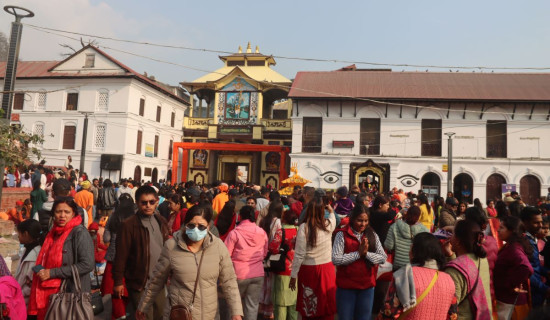- Saturday, 14 February 2026
Land Literacy Key To Secure Land Tenure
Until recently land literacy for communities has been overlooked in development debate, policy and planning in Nepal. The country is currently passing through governance reform and state restructuring process. Despite witnessing seismic political and social transformations, many misleading myths still prevail in the land sector. These need to be debunked through rigorous legal awareness and knowledge enhancement programmes, specifically for communities.
The 2015 Constitution of Nepal includes many important rights of the citizens, including the rights to land for Dalits, equal property rights for women and girls as well as right to housing for all citizens under fundamental rights. To provide appropriate housing to homeless (Article 37) and land to the landless Dalits (Article 40 (5&6), the government initiated imperative steps and achieved significant changes at policy level. However, broader land reform process has been stuck in (re)formation of commissions, (re)filing applications and data (re)collection trap.
Recent data from the National Land Commission (16 September 2021 – 21 March 2024) shows that out of around 1.35 million people lacking formal land rights, only 4,584 families received land ownership certificates. All 486 local levels out of 753, which started administering data related to landless and informal settlers into the system, reported to the commission that they had a bulk of applications filled out in an inappropriate category. In the last 30 years, government has (re)formed around 23 commissions or committees to tackle the issue of land tenure informality but were abolished with the new political shifts allowing the way for new government to establish another land commission without letting them to fulfill the mandate. This scenario indicates the serious lack of political will to meet commitments and significant absence of adequate understanding of the system and processes at all levels.
Land tenure security
Several socio-economic, political, and governance issues, conceptual confusions and practical dilemmas among public and state itself continue to surface in a new guise at each reformative juncture. Community people continue to ask as to how and when they really get registered the lands, which they have been using for more than 10 years but are still being claimed by Forest Offices, in their names. This and other burning issues are seemingly simple but complex to be sorted out.
While addressing land question in Nepal, we need to be able to clearly explain conceptual subjects related to land tenure security, their areas, specification of beneficiaries and criteria for measurement. These matters must be dealt with to resolve the complexity of the intricate land governance issues, thereby facilitating the next round land reform drive. In this context, it is useful to open discussions about how existing land tenure insecurity among the marginalised and poor communities can be addressed, as the government's genuine efforts to communicate with regard to recognising or formalising land rights of the people at the community level are scanty. In many instances, the authorities at the local level have remained unaware of the ever-changing legal and policy provisions that were introduced to fit into the changed context.
It is widely believed that land literacy can enable communities to claim, defend and promote their land and housing rights by making land and housing authorities accountable and responsible for policy and laws enforcements. Without dedicated land literacy programme, it is difficult for the local land rights activists, community and local authorities to grasp the nuances of the sectoral policies and to confidently decide and proceed. Recent land reforms have shown that most of the community people did not know the process and policies to rightly claim land rights as they couldn't see real differences between the forms aimed for landless and informal settlers and filled inappropriate one and submitted to the local level which would process it and forward to the National Land Commission. This has already affected decision about plot size families claimed and the fee that is subjected.
Transformative discussions
Community land literacy groups can be the best platform for these seemingly transformative discussions at the local levels that can provide contextual resourcefulness to adequately discuss local challenges and opportunities backed by the lived experiences. By doing so, it can reduce the chances of blinding the insights in the name of policy prescriptions from above as how to approach land tenure security and increase the chances for realising their land rights.
Land tenure rights have never been precisely defined, which is necessary for the people to have a clearer understanding of policies and initiatives to avoid inherent confusions. Thus, it has become urgent for government now set to form new commission, and land rights activists to initiate rigorous land literacy programmes for communities so that the latter will have a secure access to land, utilise other benefits that come along the formalised land rights. This also enables them to claim their land rights effectively.
That will aid people to rapidly transmit knowledge and report the problem to the relevant authority immediately, thereby impacting the land-related policy decisions for practical solutions. In this way, land literacy programme is not only a mere educational one but also a broader legal awareness and capacity-building campaign that helps both community and other stakeholders to discern the criticality of the tenure security.
(The author currently works as Data Lead and Monitoring and Evaluation Coordinator at the Asia Region.at International Land Coalition.)
















